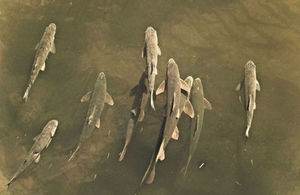Coarse fishing river close season – Public consultation
A public consultation will be conducted on the future of the coarse fishing close season on rivers in England. The consultation is open for 8 weeks, starting on 14 January 2019 and ending on 11 March 2019.

Barbell
The decision to consult the angling community and others on the close season follows a preliminary survey of 20,000 anglers conducted last year.
As part of the consultation, the Environment Agency has published a paper setting out the results of its close season evidence review and options for future regulation. The options comprise retaining the current statutory close season; retaining a close season, but starting on 15 April and ending on 30 June; and removing it altogether.
Kevin Austin, Deputy Director of Fisheries at the Environment Agency said:
We want to hear the views of anybody with an interest in coarse fisheries, their preferred way forward and the reasons and evidence to support that. This will help us decide whether there is a case for change.
Our priority is to find the right balance between angling and protecting the fish stocks on which angling relies.
Martin Salter from the Angling Trust said:
Whilst the Angling Trust will not take any formal position for or against any changes in the river close season we welcome the detailed examination of the available evidence and strongly believe that the views of all anglers should be taken into account before any decision is made.
We are pleased that this important issue is now going out to full consultation. It will doubtless arouse some strong feelings on all sides but as an angling community we shouldn’t be frightened to debate, scrutinise and consider the evidence for the laws that affect and govern our sport.
Steve Axford from the Institute of Fisheries Management (IFM) said:
The Institute of Fisheries Management is pleased to see that there will be wider public consultation on the closed season for coarse fish in rivers. We wish to help with assessment of the arguments and any further evidence that may come from the consultation and in the development of any proposed changes to byelaws that may result.
The consultation will be managed by the Environment Agency.
The current coarse fishing close season runs from 15 March to 15 June and aims to reduce risks to spawning fish caused by angling. The close season period covers most spawning by most coarse fish species. The close season on most still waters was removed in 1995 and on most canals in 2000.
The results of the preliminary survey of anglers are available online.
Notes to editors
- The report that accompanies the consultation includes a summary of the evidence around the close season and of the strengths and weaknesses of each option. We would encourage anyone participating in the consultation to read this. The complete evidence documents can be accessed from the consultation webpage.
- In our latest (2018) poll, 43% of anglers want retain the close season; 17% want to retain a close season, but change to start/finish dates; and 33% support removing it (the remainder were undecided).
- Depending on the outcome of the consultation, we may develop proposals for a change in the close season byelaw. Any proposed change must be advertised, to give everyone the opportunity to object (or support). We will respond to these objections, before applying to government for confirmation. The final decision rests with Government.
- The reasons we have chosen the 15 April and 30 June start and end dates for the “change option” are that a) delaying the start of the close season will most likely only affect three early spawning species and b) changing to 30 June provides additional protection to later or repeat spawning fish, in particular while they recover from spawning, which may increase in importance to mitigate for the effects of climate change.
- Any future change to the close season byelaw will involve a Habitats Regulation Assessment of the risks to designated species, specifically salmon, lamprey and shad.